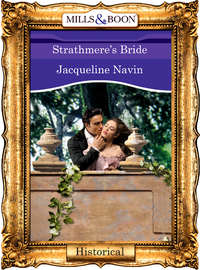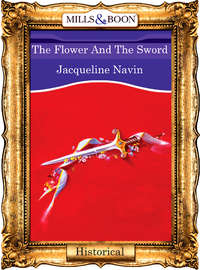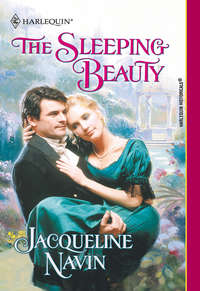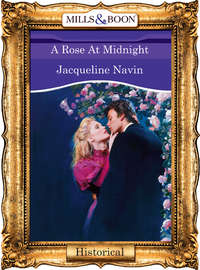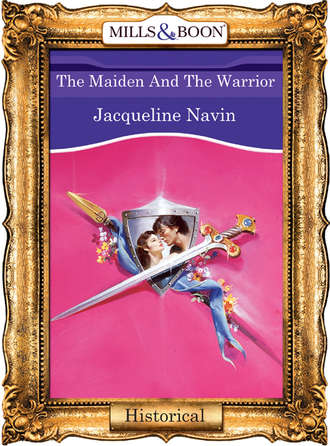
Полная версия
The Maiden And The Warrior
“Good. I want the entire contents of the castle inventoried, and the village, as well. Also, set up a forum where disputes can be brought before me. I want to establish justice quickly so that none can take advantage of the confusion to better his own lot.”
“You cannot prevent that,” Agravar said abstractly. Lucien was aware the Norseman was observing him.
“What is it?” Lucien snapped.
“What?”
“There is something troubling you. Out with it. There have never been any secrets between us.”
Agravar paused, shrugged, then settled into one of the hearth chairs. His hand played with the hilt of a knife on the table. Lucien saw it was the dirk he had used to slit his hand yesterday.
“You seem no different, Lucien. There is no less bitterness in you this day than all of the others since I have known you.”
Lucien’s head shot up as he leveled a wary glare at Agravar. His companion continued unperturbed. “It went as you planned. Our army met with little resistance and you yourself dispatched Edgar. You acted with honor and have won all you sought. Yet I cannot help but wonder if it is all truly settled.”
Lucien sat on a footstool by the raised stone of the fireplace, taking up his sharpening stone and one of the weapons. He drew the steel across the stone, making a cold, ringing sound. It was an activity familiar and calming.
Agravar said, “Nay, I see that it has done little to quell the demons that plague you. Nor mine, old friend.”
Lucien shrugged, a casual gesture belied by the tension in his voice. “There is still much to be done. This is not over. My dame remains untroubled, safe in her convent. Is that not the greatest jest, Agravar—my mother has made her home these last eleven years with a gaggle of nuns?” His expression looked grim, not in the least amused. “I must reckon with that woman when the time is right. Perhaps therein lies my peace.”
“Peace,” Agravar mused. “Is such a thing possible for us? Or are we too used to the killing to rest now that all we have sought is within our grasp at last? Why do we not take it, then, and be satisfied?”
Lucien shook his head in honest bewilderment. “Domesticity, Agravar. Perhaps it does not suit us. What a stagnant prospect—to be a country baron without battle to stir my blood.” Nodding, Lucien’s confidence in this explanation grew. “Aye, that is it. I fear this soft life I have won for myself. This is what ails me.”
“I have been thinking,” Agravar said. “Perhaps the time for hate is over.”
“The time for hate is over,” Lucien repeated in a soft, almost wistful voice. He eyed the blade he had sharpened, savoring the clean lines and purity of form in the simple weapon. The incongruity of honing the razor-sharp steel while having this conversation struck him, and he smiled to himself. He sheathed the dagger and took up another. “How does one learn to live without the very sustenance of survival?”
Agravar paused. “Perhaps we cannot. But I tire of the constant battle. It would suit me, I think, to put aside the ways of war and settle into a moderate life. To mount these broadswords upon the wall and look on them as ornaments, telling the tales of the battles we had once waged to our children, and their children after that.”
Lucien grimaced at the picture, then eyed the array of weapons that awaited his attention. No ornaments, these, they were the tools of his trade, the only life he knew.
Agravar spoke again. “I am the bastard son of a Viking raider, a symbol of my noble mother’s disgrace, despised before I was even born.” There was no emotion in his voice, it was a tale he had talked of often to his friend. “When I traveled to my father’s lands to meet my sire, I thought that finding him would bring me peace. You know as well as I how that turned out. Hendron was nothing but a vicious warmonger, no father for a son to admire. I found instead a brother, for we share the common bond, you and I. I, like you, used rage to fashion myself a warrior. I never thought of a life other than war. But my bitterness has run out. I am tired of this cursed life as an outcast. I weary of the fight.”
“You wish to go to the soft ways of country squire, do you, friend?” Lucien scoffed. “Well, I am not done with my vengeance. Peace will come when I have finished what I have set out to do. When Gastonbury is mine by Henry’s decree, and my mother is groveling at my feet, then I shall rest easy.”
Lucien wiped the last of the dried blood from his sword and carefully placed it in the scabbard. When he was done, he faced Agravar.
“If not for you, I would not have come this far. You gave your own father up to me, and that is a favor I shall not forget. But my grudge will end for me when it will, Agravar. Seek your lot elsewhere if you must, but the time for gentle living is not yet here for me.”
Agravar shook his head. “I will remain.”
Lucien nodded stiffly and preceded the Viking out the door. As they walked into the hall, they spoke tactfully of other matters.
“I have ordered the kitchens to prepare a celebration this eve, not of victory but of new loyalties and fealty ties. A calmer feast than was seen last night.”
“Tonight is soon,” Agravar considered.
“I want it so, before the castellans who were here for Edgar’s wedding leave for home. A feast may do much to heal the breach.”
Agravar gave him a long look, then smiled. “Perhaps, old friend, you are more suited to this life than you believe.”
Chapter Six
Lucien wore his usual dour expression as he took his seat at the head table to break his fast. He ordered the ornate canopied chairs Edgar had used taken away and seated himself on a plain stool.
The faces of the others in the hall, a mixture of his soldiers, who were looking bleary-eyed from last night’s revelries, and the guarded expressions of the Gastonbury folk, stared back at him. His brows lowered and they looked away. Hushed conversation buzzed like a faraway hive, for the mood was full of expectation.
Alayna entered. Their eyes locked for a moment before she turned away to sit at a trestle table with a few of the knights’ ladies.
She looked beautiful this morning, more so without the disheveled hair and grime-streaked face of yesterday. Dressed plainly, she wore a simple gown of soft fawn with trailing sleeves to reveal a cream undertunic delicately embellished with a touch of gold thread. It was much less a show of finery than most in her position would favor. Her hair was caught demurely in a net snood, with some renegade tendrils twirling seductively around her face and neck. She wore none of the makeup that was making its way into fashion lately and the chain of gold links that encircled the gentle flare of her hips was her only ornamentation.
Could it be she was unaware that this simplicity only added to her allure? Lucien wondered, then decided no. It had been his experience that everything a woman did was calculated for effect. Certainly this woman wanted to appear—what was it about her?—harmless. And that could hardly be so. She had made her intentions toward him clear, announcing herself plainly as his enemy. Thus, he could only assume she was trying to appear modest for a reason. His instincts were alert, warning against her innocent facade. But what was it she was contriving?
Alayna was aware of Lucien’s covert scrutiny. She could almost feel the touch of his eyes, making her nervous though she was determined not to let it show. Keeping her own gaze carefully averted from his direction, she made a point to relax, pretending to enjoy the company of her companions, a group of gossipy knights’ ladies whom she found boring at best, and at worst irritating.
“He does not wish us to rebel,” one woman whispered.
“Well, if he wishes Henry to favor him, he needs to demonstrate he can keep the peace, keep control,” a young blonde added, blushing at the surprised looks her insight won from the others. “That is what Geoffery says anyway.”
“He is not afraid of rebellion, Anne. Your Geoffery is correct, he does it for his ambition, not of fear. What has he to fear? He has already defeated us.”
Anne leaned forward, casting a sly look over at the dais. “Well, if he is looking for a welcome, he should come see me.”
“Him? Did you not notice Sir Will? He could make me swoon with just a word!” said another with a roll of her eyes.
An older woman scoffed, “You would swoon at a word from old Gerald!”
Alayna forced herself to laugh along with them, though she was having trouble attending to their conversation. She was tired, having spent the better part of the night going through Edgar’s trunks, now safely deposited in her chamber. It was difficult deciding how to best make use of them. She had the sumptuary laws to consider. A peasant was not allowed to wear certain materials or colors reserved for the nobility and clergy. But Alayna had no choice but to interpret the dress code guidelines broadly. She was determined the stolen garments would serve her intended purpose, and the peasants of the shire would sport a king’s ransom worth of finery.
Lucien continued to glower at her from his seat on the dais. Her laughter sparkled louder.
“Lady Alayna,” a voice said, and she looked up to see Sir Will smiling at her. The ladies around her twittered, offering their anxious greetings to the knight. He gave them a cursory nod. “You seem to be passing a pleasant morn.”
“Pleasant enough,” Alayna answered. She liked him. He was an out-rageous flirt, but she sensed in him a kindness, as well.
“May I sit with you?” Will asked. Alayna nodded. He sank beside her on the bench. “It is good to see you doing so well this day. You seem none the worse for the trials of late.”
“Really?” she answered.
His eyes stared warmly into hers, and Alayna realized he was singling her out for his attention. The other women stared at her with envy.
“Well, I suppose no one expects everything to return to normal immediately,” Will said, “but laughter is a good medicine.”
A new voice cut in, drawing their attention. “Indeed, your merriment is intriguing, my lady. Newly conquered peoples rarely can be heard laughing so soon after their defeat. Please, share it with us so we may all enjoy along with you.”
Alayna’s head snapped up. It was, of course, de Montregnier, and he did not look in the least interested in sharing her amusement. His voice was even enough, but his expression was daunting. It was as if he sensed she had put on the show of gaiety to gall him. By the look of him, she had fairly succeeded.
The women sat in tense silence.
“‘Twas only a diverting story that made me laugh, for ’twas most ridiculous,” Alayna said, and shrugged.
“Please, demoiselle,” he urged, “let us in on the hilarity.”
She narrowed her eyes. “‘Twas nothing, I said.”
“But I insist,” he countered. “If you keep eluding the question, I will be left to think that you have been caught discussing me.” His gaze matched hers, brilliant black and hard.
She realized he was bullying her apurpose, but she could not keep herself from snapping, “Not you, but of a completely different man. The jest was of a lowborn cur who captures a castle and its people, then struts about as its lord. ’Tis a most funny anecdote.”
She heard a sharp intake of breath from someone, and immediately, she knew she had gone too far. A quick glance about confirmed her fears. Pelly, who stood behind his lord, looked positively apoplectic, and even Will’s steady smile had faded. The only one who did not look stricken was de Montregnier himself.
“How delightful,” he purred, his eyes telling a different story. “When I have time in the future to waste on the obtuse meanderings of a woman, I would like to hear more about it. The circumstances of your comedic tale are not dissimilar to my own. Oh, had you not realized? I wonder if this poor fellow is also plagued with witless women who laze about grazing endlessly at the morning meal.” He let his insult settle over her before offering a small, diabolical smile. “Have a pleasant morn, my lady. Will! Pelly!”
In the wake of his departure, Alayna became aware of the awkward stares of the women around her.
“My,” said Anne, “you certainly made an impression.”
The women erupted in laughter. Alayna pulled herself up straight. Rising, she excused herself, hearing the poorly repressed snickers hissing behind her as she went.
A short time later, she was back in her chamber with her nurse, still smarting from de Montregnier’s stinging words.
“Ah, look at this tiny piece,” Eurice exclaimed, holding up a small tunic she had fashioned for a tot.
“Methinks it needs some ermine,” Alayna teased, placing a strip of the stuff around the neckline.
“Lord have mercy on us—serfs in ermine! The new master is sure to string us up if he sees that!”
“’Tis well he does not know what we are about, for surely this fur would wilt under his dour sulk.” Alayna shrugged.
Eurice looked at her curiously. “Do you not think he is handsome?”
“Are you daft?” Alayna bristled. “Handsome? With all of that scowling and glowering, one can barely distinguish his features. Besides, I was too angered to notice—I swear I could hardly see for all of the red before my eyes.”
“’Tis difficult not to notice. Even if his features were not fine, he would be appealing for his proud bearing. Did you not even notice how tall and broad he was? How strong he looked?”
Alayna wondered what game her nurse was about. Her voice dripped with sarcasm. “Aye, Eurice, it did occur to me when he was dragging me into the chamber to wipe his own blood on the bed linens that he was indeed very strong. Then, later, as he was insulting and threatening me, I was quite impressed with his good looks.”
Eurice’s smile was cryptic as she concentrated on her stitching. “Yet you did not notice his face?”
“He is too often frowning,” Alayna snorted.
“The man is haunted,” Eurice said.
Alayna considered this for a moment before she stabbed her needle into the cloth once again. “Perhaps. Now he has earned himself one more ghost to plague him.”
They fell silent, working until it was time for the midday meal. Alayna was relieved to see that Lucien was not in the hall with the others. She was, however, annoyed to learn that preparations were being made for a feast that evening. Everyone was talking excitedly about it, half in shock at the gracious way their new lord was conducting his first days in power. The people of any castle were used to war, it was a staple of life and they accepted their lot with bland resignation. Now there was tremendous relief after the ironfisted reign of Edgar. It irked Alayna to see how easily de Montregnier was winning approval.
After she had eaten, she visited the infirmary and was heartened by the improvements she found, especially Hubert, who was recovering nicely. When she had seen to her self-appointed chores and was satisfied that she was no longer needed, she returned to her chamber and took up her needle again.
Alayna decided not to attend the evening’s festivities. Against her nurse’s protestations, she reasoned, “I shall simply send down word to him of illness or fatigue, some excuse. I’ll not subject myself to his onerous company again.”
“Alayna,” Eurice warned, “do not tempt him!”
“Nonsense, he will not mind. He hates me as much as I do him. Even if it does vex him, de Montregnier would not be so coarse as to make an issue of it.”
Eurice left her with a disapproving look. Alayna changed into a soft linen tunic, curling up by the blazing fire to sew before retiring. It felt good to put the aggravating de Montregnier out of her mind. Without warning, her peace was interrupted by the abrupt thud of her chamber door being flung open. Terrified, she sprang to her feet.
It gave her no relief to see that it was de Montregnier who stood in her doorway, his face like a thundercloud. He pinned her with his dark glare for a moment before he spoke. “I just received word that you would not be joining us. Your message said you were ill. Odd, you seemed quite fit earlier today.”
His voice was a low growl, snarled from between clenched teeth. It took Alayna a moment to find her voice. “Aye. I do not feel well. It is probably only fatigue, but I beg your pardon from the evening.”
“But I do not grant pardon, lady, for you seem to have recovered nicely from whatever mysterious ailment has afflicted you. In fact, you look the very essence of health.”
He let his eyes travel slowly as if assessing her fitness. His languid perusal made Alayna instantly aware of her flimsy shift, no doubt rendered almost transparent in the light of the fire. Blushing hotly, she turned away, grabbing her dressing gown. When she had put it on, she turned to face him once again.
“Your manners are abominable, de Montregnier, as usual, though I do not know why I would expect a lowbred cur such as yourself to ever demonstrate anything but the rudeness you so often favor.”
Lucien raised a brow. “That is the second time you have said that. What makes you think that I am lowborn?”
Alayna scoffed at him with a harsh laugh. “It is obvious that you are unused to gentle company. I think you enjoy playing the rogue to shock and offend. I know nothing of your breeding, and indeed, have learned that right of birth is rarely an indication of character.”
“Take your late husband, for example,” Lucien said smoothly.
Ignoring his comment, Alayna continued tersely. “Your behavior speaks of your ignorance, all matters of ancestry behind.”
“Aye, ’twould no doubt amuse you to learn of the history of my ancestors,” Lucien said darkly.
“You act the blackheart, and then bray like an ass when called one. You are a puzzlement, de Montregnier. Were I at all interested, I would find your behavior quite curious. You are terribly inconsistent—almost as fickle as a woman!”
Her barb hit home. His face grew dangerous. “As for behavior,” he snarled, “yours leaves much to be desired. Your lies and deceptions to avoid me are hardly admirable, though I expect no less from a woman. However, you are the widow of the late lord, and as such I require your presence at the feast. You look well enough to me. Your previous incapacitation seems to have been resolved. Now, dress promptly and join us in the hall. I will wait the meal for you.”
“Nay!” Alayna exclaimed, incensed at this arrogant command. “I will not play the lady of the castle when you sit as its lord.”
Lucien moved forward with the unexpected swiftness of a cat until he stood just before her. She had to tilt her head back to meet his glaring look. Up close, she could see his eyes were a clear brown with dark lashes, unusually long for a man. Trying to look undaunted, Alayna forced her chin up.
“Do not play this game again with me, lady, for you know well you cannot win. I will have your presence in the hall this night at my side. Think on the privileges you now enjoy, for I have been more than generous in allowing you your freedoms. These are arrangements I can easily alter.”
Her eyes widened at this threat. Before she could muster a suitably caustic reply, he spoke again, his eyes softened as a teasing light appeared. “Your rebelliousness surprises me. It is most foolish. Though you have many faults, stupidity does not seem to be one of them. You would do well to try and please me. Is that not what your sex excels at? Cultivating power by weaving charm about a man, much like a spider wraps its prey in her web before devouring it. And who knows, demoiselle, perhaps you will not find my favor all that onerous.”
“What makes you think I would ever want the least favor from you?” Alayna gasped. “You men think so highly of yourselves, assuming any woman would be flattered to be graced by your attentions. Well, some of ’my sex’ care not a whit about pleasing a man. Make no mistake, your good graces are the furthest thing from my desire. What I seek is to be as far away from your arrogant, odious presence as I can get.”
She lowered her voice as she continued in a tone of solemn avowal. “I will wait on King Henry’s decision, but I have no doubt that day will win my freedom, and when I am free, I will spare you no thought other than an occasional shudder when I think of you. Now get yourself from this room, for you have no authority over me that I recognize.”
Lucien regarded her dispassionately for a long moment before he stepped away. He went to the door and, just as Alayna was feeling triumphant, called over his shoulder in a flat tone.
“Keep to your solitude, then, cold lady. I see now that your waspish tongue and shrewish disposition would sour our celebration. My guests and I will do better to make merry without you.”
Alayna stood openmouthed at this statement, stunned with the impact of his words. She was unable to make any reply as he stalked out of the chamber, closing the door behind him with infinite gentleness.
Chapter Seven
The room was enveloped in silence, the only sound the soft echo of his fading footsteps beyond her chamber door. She stood alone, unable to move, with his last words echoing in her head.
Dear Lord, he was unbearable! How dare he forbid her from the celebration!
Restless, she began to pace in front of the hearth.
How could he stand there and have the gall to suggest she curry his favor? Was he mad? He must be, or too intoxicated with his newfound power to have any sense.
She turned on her heel and stomped back toward the door.
He was a cold, selfish, unfeeling brute. He was so full of himself, so impossibly arrogant that it was amazing he had not exploded with self-importance already.
Picking up a carved ivory brush, she flung it at a wall as she circled back to the window.
God’s mercy but she hated him. He was almost pitiful, so obvious in his attempt to goad her into bending to his will. She was not deluded by his ploy. Of course, he was counting on her anger to prod her into going down to his damnable feast. Well, he was mistaken if he thought she would be so easily duped.
She flounced down onto the window seat, looking with unseeing eyes out onto the bailey. It was a familiar perch, for she had favored this spot during the long, dark days at Gastonbury before de Montregnier’s arrival.
Seated here again, she was struck with the vivid recollection of the despair of those times. Could it truly have been only days ago? It seemed a lifetime. Dear Lord, at least she was no longer with Edgar.
It was an incongruent thought, but it was nonetheless true.
She loathed de Montregnier with his high-handed arrogance and his quick-witted barbs. Yet she was without a doubt much better off for his having defeated Edgar and taken over Gastonbury. Brutal and insensitive he was, but she could not honestly hate his prowess on the battlefield, for it had saved her from the unthinkable fate of living as du Berg’s wife.
De Montregnier wished to use her for his ends, but he had never really caused her any damage. All he had done was detain her. True, he was a dishonorable liar and a ruthless schemer, but at least he was not a lecher, or worse. He had not harmed her. And she had to admit she was not completely blameless. She had done much to antagonize him.
It almost certainly would have gone worse for her with another.
Perhaps she was acting a bit peevish. Not without cause, to be sure, yet still more thin-skinned than her normal habit. There was something about de Montregnier that riled her to her worst displays of temper. She suddenly realized she was not very proud of that. Most assuredly, she was ashamed to be hiding in her room to avoid a confrontation. What would her mother say of such cowardice?
Alayna came to her feet. She did not stop to examine her motives. With a sense of determination, she flung open the lid of the chest that held her finest gowns. She would have no help dressing, so she chose a simple, long tunic of deep rose brocade. Pulling it on quickly, she rummaged through another trunk to find an unadorned girdle of gold and a delicate filigreed circlet for her hair. She fetched the ill-used brush and roughly applied it until the mass of curls gleamed in a shimmering cascade down her back. She placed the circlet on her unbound tresses and slipped her feet into the soft slippers that matched her gown. Thus garbed, she smoothed her hands down the front of her dress, took a deep breath and hurried to the hall.


